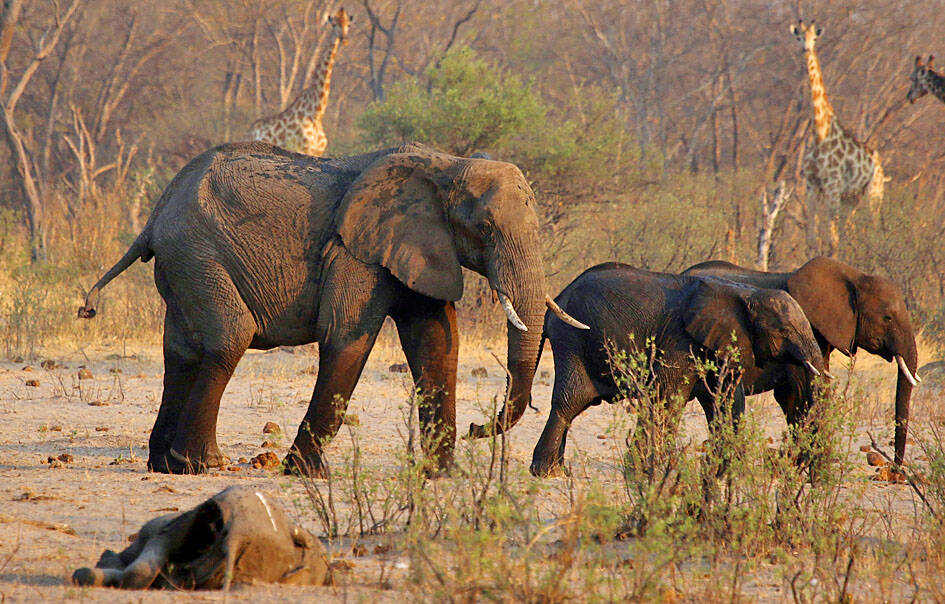Zimbabwe would cull 200 elephants as it faces an unprecedented drought that has led to food shortages, a move that would also allow it to tackle a ballooning population of the animals, the country’s wildlife authority said on Friday.
The country has “more elephants than it needed,” Zimbabwean Ministry of Environment, Climate and Wildlife said in the Zimbabwean parliament on Wednesday, adding that the government had instructed the Zimbabwe Parks and Wildlife Authority (ZimParks) to begin the culling process.
The 200 elephants would be hunted in areas where they have clashed with humans, including Hwange, home of Zimbabwe’s largest natural reserve, ZimParks director-general Fulton Mangwanya said.

Photo: Reuters
Zimbabwe is home to an estimated 100,000 elephants and has the second-biggest elephant population in the world after Botswana.
Thanks to conservation efforts, Hwange is home to 65,000 of the animals, more than four times its capacity, ZimParks said.
Zimbabwe last culled elephants in 1988.
Neighboring Namibia this month said that it had already killed 160 wildlife in a planned cull of more than 700 animals, including 83 elephants, to cope with its worst drought in decades.
Zimbabwe and Namibia are among a swathe of countries in southern Africa that have declared a state of emergency because of drought.
About 42 percent of Zimbabweans live in poverty, according to UN estimates, and authorities say about 6 million would require food assistance during the November to March lean season, when food is scarcest.
The move to hunt the elephants for food was criticized by some, not least because the animals are a major draw for tourists.
“Government must have more sustainable eco-friendly methods to dealing with drought without affecting tourism,” Center for Natural Resource Governance director Farai Maguwu said.
“They risk turning away tourists on ethical grounds. The elephants are more profitable alive than dead,” he said. “We have shown that we are poor custodians of natural resources and our appetite for ill-gotten wealth knows no bounds, so this must be stopped because it is unethical.”
However, Chris Brown, a conservationist and CEO of the Namibian Chamber of Environment, said that “elephants have a devastating effect on habitat if they are allowed to increase continually, exponentially.”
“They really damage ecosystems and habitats, and they have a huge impact on other species which are less iconic and therefore matter less in the eyes of the Euro-centric, urban armchair conservation people,” he said. “Those species matter as much as elephants.”
Namibia’s cull of elephants has been condemned by conservationists and the animal rights group PETA as short-sighted, cruel and ineffective.
However, the Namibian government said the 83 to be culled would be only a small fraction of the estimated 20,000 elephants in the arid country and would relieve pressure on grazing and water supplies.

Four people jailed in the landmark Hong Kong national security trial of "47 democrats" accused of conspiracy to commit subversion were freed today after more than four years behind bars, the second group to be released in a month. Among those freed was long-time political and LGBTQ activist Jimmy Sham (岑子杰), who also led one of Hong Kong’s largest pro-democracy groups, the Civil Human Rights Front, which disbanded in 2021. "Let me spend some time with my family," Sham said after arriving at his home in the Kowloon district of Jordan. "I don’t know how to plan ahead because, to me, it feels

The collapse of the Swiss Birch glacier serves as a chilling warning of the escalating dangers faced by communities worldwide living under the shadow of fragile ice, particularly in Asia, experts said. Footage of the collapse on Wednesday showed a huge cloud of ice and rubble hurtling down the mountainside into the hamlet of Blatten. Swiss Development Cooperation disaster risk reduction adviser Ali Neumann said that while the role of climate change in the case of Blatten “still needs to be investigated,” the wider impacts were clear on the cryosphere — the part of the world covered by frozen water. “Climate change and

Poland is set to hold a presidential runoff election today between two candidates offering starkly different visions for the country’s future. The winner would succeed Polish President Andrzej Duda, a conservative who is finishing his second and final term. The outcome would determine whether Poland embraces a nationalist populist trajectory or pivots more fully toward liberal, pro-European policies. An exit poll by Ipsos would be released when polls close today at 9pm local time, with a margin of error of plus or minus 2 percentage points. Final results are expected tomorrow. Whoever wins can be expected to either help or hinder the

DENIAL: Musk said that the ‘New York Times was lying their ass off,’ after it reported he used so much drugs that he developed bladder problems Elon Musk on Saturday denied a report that he used ketamine and other drugs extensively last year on the US presidential campaign trail. The New York Times on Friday reported that the billionaire adviser to US President Donald Trump used so much ketamine, a powerful anesthetic, that he developed bladder problems. The newspaper said the world’s richest person also took ecstasy and mushrooms, and traveled with a pill box last year, adding that it was not known whether Musk also took drugs while heading the so-called US Department of Government Efficiency (DOGE) after Trump took power in January. In a